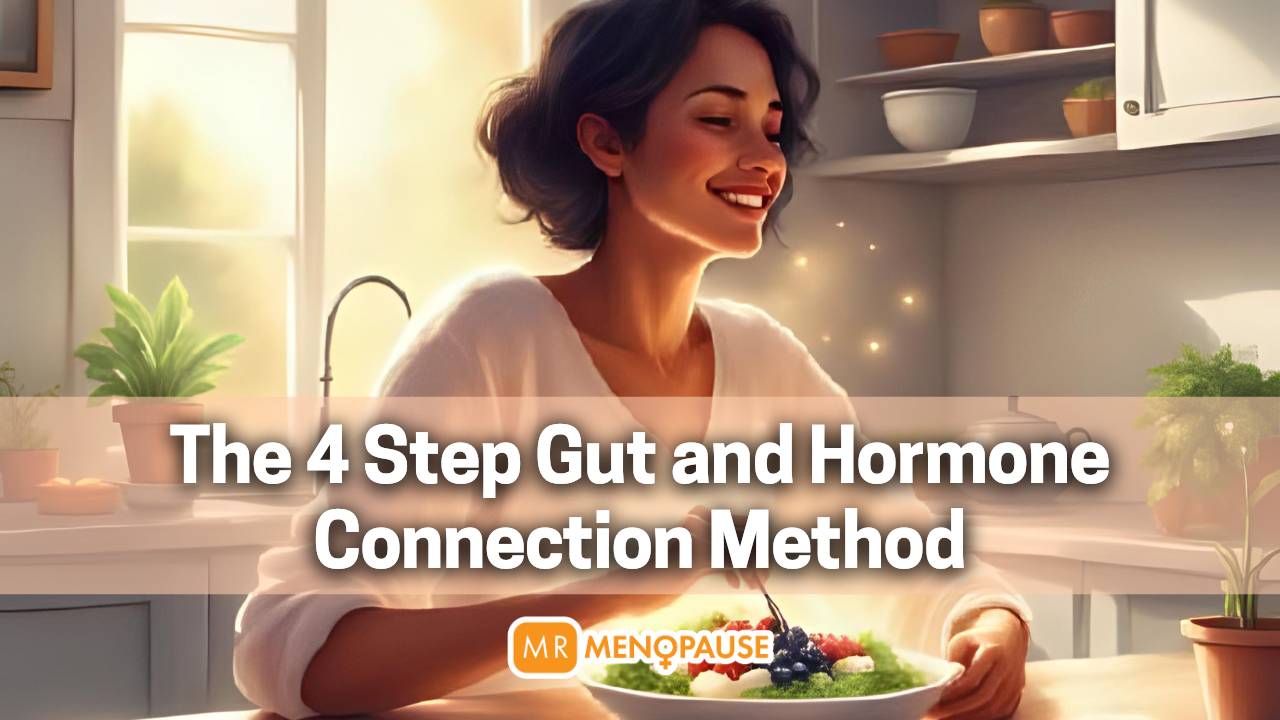
The 4-Step Gut and Hormone Connection Method
A simple, science-backed way to bring your body back into balance
Your gut and hormones are in constant conversation with each other. They influence everything from your energy, mood, and metabolism to your sleep quality and daily energy levels. During menopause, that connection becomes even more important.
The good news is that supporting it does not have to be complicated.
The 4 Step Gut and Hormone Connection Method is a straightforward, research-supported approach that helps restore balance from the inside out. Each step builds on the last, guiding you toward better digestion, steadier hormones, and a body that feels like your own again.
Let’s begin.
Step One: Assess What Is Really Going On
Healing starts with awareness.
Before you change your diet or start supplements, take time to listen to your body without judgment.
Ask yourself:
- Do I feel bloated after eating?
- Do I have irregular bowel movements?
- Do I crave sugar or carbs more than before?
- Do I feel tired or foggy after meals?
- Do I feel inflamed or achy in my joints?
These are your body’s early clues that your gut may need support.
If you want a deeper understanding, consider functional testing such as a stool or microbiome analysis. However, simply paying attention can be transformative. The more you observe your body’s patterns, the easier it becomes to see what needs your attention.
Research has shown that postmenopausal women often experience lower gut diversity, and those with more symptoms tend to have different bacterial profiles than women without them. This means that gut imbalance is common, but it is also reversible once you recognize it.
Awareness is always the first step toward healing.
Step Two: Address the Root Causes
Once you know your gut needs support, focus on creating balance rather than restriction.
Feed your good bacteria with fiber-rich foods such as leafy greens, beans, oats, and berries. Add probiotic foods like yogurt, kefir, sauerkraut, kimchi, and tempeh to help restore microbial diversity and improve digestion.
Stay hydrated. Move your body daily. And take time to breathe. Even a few deep, intentional breaths can calm your nervous system and support the gut-brain connection.
Limit processed foods, sugar, and alcohol because they feed harmful bacteria and increase inflammation. And remember, your gut does much of its repair work while you sleep.
Research continues to confirm that poor diet, high stress, and low movement can all disrupt gut balance after menopause. The encouraging news is that your daily habits can also reshape and strengthen your internal ecosystem.
Your choices create your chemistry.
Step Three: Adapt for Long-Term Gut Resilience
Menopause is not something to survive. It is a season that calls for care, patience, and a little extra compassion for yourself.
Slow down when you eat. Chew your food thoroughly and enjoy it. Mindful eating allows your digestive system the time it needs to function correctly.
Fill your plate with a variety of colorful plant-based foods. The more diverse your diet, the stronger your gut microbiome becomes.
Add targeted support when needed. Magnesium helps muscles relax and supports bowel regularity. Omega-3 fatty acids lower inflammation and protect brain health. A high-quality probiotic can be beneficial, but only when paired with healthy habits, good nutrition, regular physical activity, and adequate rest.
Healing takes time, but the results are absolutely worth it: better energy, clearer thinking, smoother digestion, and a greater sense of ease in your body.
Step Four: Ascend and Thrive Beyond Gut Healing
Once you have assessed, addressed, and adapted, it is time to ascend.
This is the phase where you move beyond simply feeling better and begin truly living better. It is where knowledge becomes empowerment and habits become harmony.
You start to trust your body again. You understand what supports you and what drains you. You build routines that feel natural and enjoyable. You move your body because it energizes you. You eat to nourish your health and vitality.
And best of all, you begin to feel joy again.
Here is something you may not know. About ninety percent of your body’s serotonin, the feel-good chemical that supports mood and relaxation, is produced in your gut. When your gut is balanced, your brain feels calmer, your mood lifts, and your entire body feels lighter and more resilient.
That is what thriving through menopause truly looks like.
The Takeaway
The takeaway I hope to inspire is this. Your gut is more than just a digestive system. It is a powerful communication center that influences your hormones, mood, and overall vitality. By following The 4-Step Gut and Hormone Connection Method, you can restore harmony to your body and create lasting well-being that carries you through menopause and beyond.
Ready to take the next step?
Start with the Menopause Clarity Quiz at www.MenopauseClarityQuiz.com and begin your journey toward greater understanding, steady hormones, and lasting confidence in your body.
Your go-to guide and ally for reliable menopause and healthy aging support,
Tafiq Akhir | Mr. Menopause®

